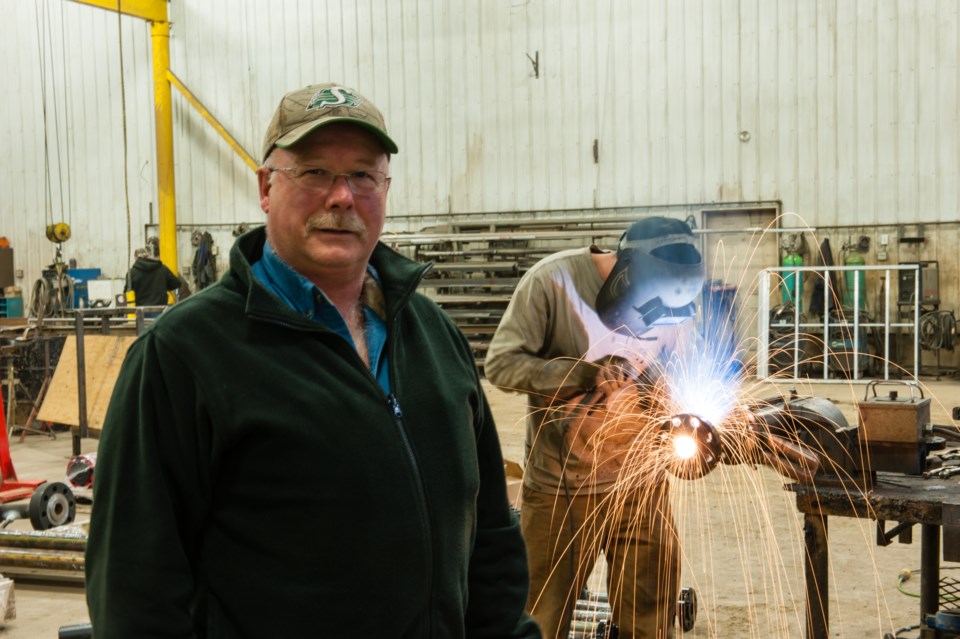Maidstone– Asked how things have been going, Bob Ormiston of GreMur Industries Ltd. in Maidstone responded, “It’s going.”
“It’s been relatively slow the last three years, ever since oil took a dive.”
Pipeline Newsvisited GreMur on Feb. 21.
“I see a little more action in the field,” he said, noting there are a few drilling rigs nearby. He pointed out Husky has got a few projects going on including the Rush Lake 2 and the Dee Valley thermal projects, each planned for 10,000 bpd production.
“The pad is already made up at Rush Lake,” he said.
GreMur provides construction maintenance for the oilfield, including general welding. They’ve done rig welding as well, but are not doing so at the moment. The company has five crew trucks and two welding trucks, plus various contractors. The work is general for local producers.
“There’s maintenance going on. The dollars are tight. They want to spend the least they possibly can,” he said.
Like most other oilfield services companies, GreMur has gone through a few rounds of rate cuts during this downturn.
“Before it went south, it was so busy, you could hardly find a guy to work,” Ormiston said. “That was December 2014. Then in January, there was absolutely no work.”
He guessed there was a million square feet of empty shops in Lloydminster industrial parks. A drive through the Border City by Pipeline News the next day confirmed a high number of industrial shops with “For Lease” signs in front.
“Heavy oil employs more people than any aspect of the oil industry. I have seven employees, plus a secretary. I’ve had to lay guys off. I was at 12, in 2014,” Ormiston said.
“The price of oil is not going to be anywhere near what we have seen for a long time. I think we are going to have to be happy with oil prices between where they are today and maybe a high of US$60. Who knows, which, in the big scale of things, is not that bad.”
When the price of oil was US$100 per barrel, it was a little crazy, too. Ormiston said, “Let’s face it, there was so much chaos at that. You can’t find the people. They want you to get more iron. Men will jump (to other companies) for a buck an hour. Now, people get a job and they will work harder to hold it. I think you see that in any town oil is in.”
“I think the oil industry is going to have a tough time replacing people when the time arrives where they need new people. There is not the people, and they don’t want to come back, to go through this all over again. The feast and the famine, in the big picture, is it really worth it? A stable job, with benefits, for years and years – a lot of people are heading in that direction,” Ormiston said. “It’s sad. I’ve spent my whole life in the oil industry. You can see it.”
Ormiston said this downturn has been worse than the downturn of 1986. Back then, he said, “I spent a lot of time on the phone, looking for work. I was all over Western Canada.”
This downturn, he said, has been longer, and is hitting more areas. Ormiston said, “This industry employs so many people. Some people are naïve to what’s going on. It’s not just the oil workers and direct people working in the oilfield. It’s right across the whole country. This country is geared for energy, I don’t care what anybody says. It runs on energy. It employs so many people. You take the oil factor out of Canada, what do you do with that many people?
“You can farm 100 sections of land with 10 people.”
Ormiston thinks 2017 will be better for them than 2016. “There’s a lot of good talk out there,” he said, but added he doesn’t expect oil to go up much in price, so people have to be happy with where it is, up to US$60 per barrel.
He’s not looking at hiring now, but he’s buoyed by seeing some drilling and service rigs around. “Last year, you could hardly find a rig around this country,” Ormiston said.
Asked when he expects companies like his can start bringing their rates up again, he responded, “I think it’s going to be a year-plus. Until there’s better signs, we’re in this for the long haul. If we can keep our heads above water for the time being, that’s all you can ask for.”




